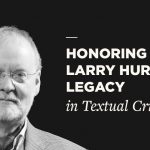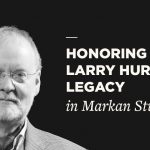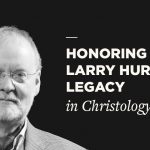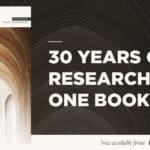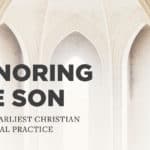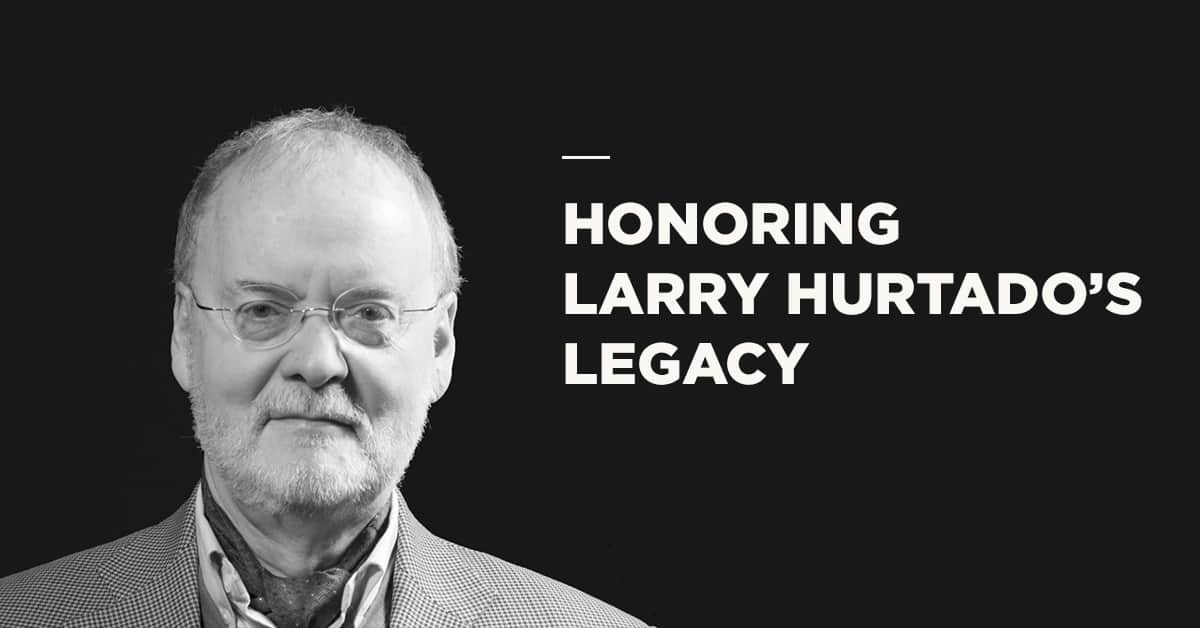
This week, in remembrance of his death nearly one year ago, Lexham Press will be running a series of blog posts honoring Larry Hurtado’s legacy and contributions to biblical scholarship. The first post was focused on Christology. The second post covered Hurtado’s contributions to Markan Studies. The third post revealed Hurtado’s often overlooked work in textual criticism. This final post was written by Derek Brown.
Larry W. Hurtado was one of the most notable New Testament scholars in recent decades. His contributions to several fields—most notably Christology and textual criticism—will continue to influence for many years to come. One of the key arguments of his work on Christology is that if we want to understand early Christian devotion we have to look not just at the beliefs and confessional claims of Christ followers, but also at their devotional practices. In a sense, Hurtado suggested that if we were to peer into the hypothetical windows of early Christian gatherings we would see how their Christ-centered worship practices demonstrate that they regarded the risen Lord as divine. The theological and confessional claims of the New Testament are, of course, essential for historical inquiry, yet the practices of early Christians serve as undeniable and critical pieces of evidence.
Many of the reasons Hurtado was so influential in New Testament studies are quite well known. After serving as a pastor early in his career he taught for many years in Canada, first at Regent College (1975–78) and then the University of Manitoba (1978–96). He spent the final phase of career as Professor of New Testament Language, Literature and Theology at the University of Edinburgh (1996–2011). Throughout this period of teaching and administration Hurtado authored countless scholarly articles and essays for major publications and several influential books, several of which are essential reads. As a New Testament generalist (something of a dying breed these days), he contributed to several scholarly fields including Markan studies, textual criticism, and Christology. One would be hard-pressed to draw up a more impressive list of academic achievements.
These accomplishments testify to Hurtado’s contributions to the scholarly community. Taking a page from Hurtado’s book, however, I would suggest that it was his practices—and not just the items that can be listed on his robust scholarly résumé—that give us a full understanding of his lasting significance. As one of his former PhD students I am grateful that I was able to observe many of these practices first hand. These experiences, coupled with stories I have heard from others as well as his general reputation around the world, serve as undeniable evidence of Hurtado’s legacy among scholars and his friends.
Hurtado conducted himself as a scholar who served with charitable practices. From the first email I sent to Hurtado as an aspiring PhD student to the professional and personal advice he gave me in recent years, he always seemed to take me seriously and make time to hear my incessant (and often misguided) questions. I knew his schedule was demanding, so I felt honored by the respect he showed me in this manner. Doctoral supervisors face the arduous and unenviable task of reading numerous drafts of chapters by their students. Many of these writings must be mind-numbing at best. Yet Hurtado generously read my in-progress work, providing invaluable feedback every single time. He also willingly spent time with his students in various settings. He was one of few faculty in Edinburgh to join postgraduate students for meals in the marvelous Rainy Hall at New College. And he would happily join them for a pint at the Jolly Judge after a long day of research. He organized a breakfast with his former students during the week of the SBL annual meeting. And who can forget the day trips to Dublin he arranged to view the biblical manuscripts at the Chester Beatty Library?
Hurtado’s work was also characterized by acts of wisdom. His many years of teaching and the breadth of his scholarship uniquely qualified him to supervise doctoral students. In my experience he seemed readily willing to draw on his own past—failures and successes alike—to impart sagacious words on whatever the situation might be. When my original doctoral project (on Jesus) ran aground, he calmly shepherded me to a new topic (Satan) that proved to be even more rewarding. (*Insert generic joke about the devil here.*) As I prepared for my viva—the oral defense examination of a doctoral dissertation—he helped me figure how to talk about my project and its overall contributions. If you had questions about the job market or potential publishing opportunities, Hurtado was more than willing to offer you his take. If, as a new arrival to Edinburgh, you needed guidance on the city’s bus routes, well Hurtado knew those as well. Of course Hurtado never needed an invitation to offer up his views. Those who have witnessed Hurtado in action will likely recall his penchant to respond to virtually every paper with the words, “I’m not convinced” followed by a litany of comments on the cogency of the argument. Such a response may sound harsh, but the goal was always to help correct and build up.
When it came to scholarly work, rigorous integrity was Hurtado’s modus operandi. He held others to high standards because he held himself and his research to the same expectations. His scholarly work reflects a strong command of both primary texts and secondary literature. He expected his students to have a similar, even if less developed, knowledge of the field. As my doktorvater, he pressed me at every turn on matters such as foreign languages, grammar, textual criticism, and argumentation. Respect was gained through the high demands of deep commitment to high quality research and writing. I’ll never forget when he encouraged me to write to scholars when I critiqued their work to make sure that I had represented their work fairly. This task was intimidating, I confess, but ultimately the practice helped me become a more honest and gracious scholar. Hurtado’s industrious habits made me want to work harder, to read more deeply and broadly, and to be generous in how I conducted myself as a scholar.
Above all I will remember Hurtado’s insatiable curiosity for anything related to early Christian origins. I don’t know how to spin this quality in terms of a scholarly practice, but I can attest to how contagious it is to experience. Many of us who devote ourselves to scholarly endeavors find that interest in our (self-chosen!) subjects can wax and wane. By contrast, Hurtado’s hunger to learn seemed only to deepen over the years. Even though he established several key arguments in major fields, he continued to read new research, attend conferences, and publish scholarly work. Through these avenues he remained open to fresh arguments and new findings, even when they challenged his own work. He always pressed on toward the goal to better understand the significance of the Lord Jesus Christ and the remarkable texts produced by those who first worshipped him.
I miss my doktorvater, Larry Hurtado, especially at this time of year when we typically gather for the fall conferences. Yet I am thankful for the chance to have known and worked with such a titan of a scholar. And I am deeply grateful for the legacy he left behind in his writings and his students, both living artifacts of his practices as a reputable and significant scholar.

In honor of Larry Hurtado’s work, we’re offering Honoring the Son: Jesus in Earliest Christian Devotional Practice for just $5 through the end of the month.
